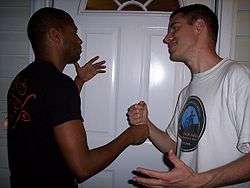Giving dap

Dap is a friendly gesture of greeting, agreement, or solidarity between two people that has become popular in western cultures, particularly since the 1970s,[1] originating from African American communities. Giving dap typically involves handshaking (often, by hooking thumbs), pound hugging, fist pounding, or chest- or fist bumping.[2] The practice and term originated among black soldiers during the Vietnam War, as part of the Black Power movement,[1][3] and the term is attested since 1971.
Giving dap can refer to presenting many kinds of positive nonverbal communication between two people, ranging from a brief moment of simple bodily contact to a complicated routine of hand slaps, shakes, snaps, etc. known only by the two participants. Elaborate examples of dap are observed as a pregame ritual performed by many teams in the National Basketball Association.[4] These choreographed actions are rarely televised and serve as a superstitious means of psychological preparation and team solidarity.
Etymology
The etymology of dap is uncertain, and there are various theories. Most simply, it may be imitative (compare tap, dap), and is sometimes explained as an acronym for dignity and pride,[3] possibly a backronym.
Variants
There are many variants of complicated dap gestures.
- The "Lock and fly" is used in the West Indies and Caribbean Islands and is popular among the Rasta community. It consists of two movements: a full flat-palm grasping of a partner's hand followed by sliding of the palms in a forward motion finally finishing with a flexion and extension of the fingers.
- The "Daps Explosion" is recognizable by the opening of the fist and fist's departure from its original location with the intent to mimic an explosion.
- An unnamed yet popular variant involves slapping one's hand with the other's, each sliding their hand toward themselves, culminating to the impact of their closed fists
- The simple "fist bump" in which their closed fists gently yet swiftly impact.
References
- 1 2 Dalzell, Tom (2009). The Routledge Dictionary of Modern American Slang and Unconventional English. Taylor & Francis. p. 271.
- ↑ Green, Lisa J. (2002). African American English: A Linguistic Introduction. Cambridge University Press. p. 144.
- 1 2 Hamilton, LaMont (2014). " Five on the Black Hand Side: Origins and Evolutions of the Dap." Smithsonian Center for Folklife and Cultural Heritage. Smithsonian Institution.
- ↑ Sargent, Scott. "The Secret World of NBA Daps". SB Nation. Retrieved May 1, 2013.
External links
| Look up dap in Wiktionary, the free dictionary. |